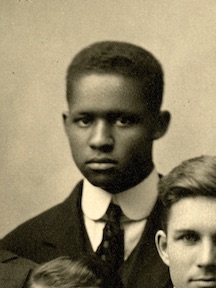By Ryan Kambich
In a time largely marked by vicious segregation, David Alphonso Lane (Bowdoin College, 1917) lived a remarkable life of excellence in the field of education and in service to his country. Born in October of 1895 outside of Washington, DC, Lane was just the fifth African American student to graduate from Bowdoin, and did so magna cum laude as a member of Phi Beta Kappa. While a student, he excelled as a debater and won the university’s prestigious Class of 1868 Prize for oratory.
The United States entered into the first world war just prior to his graduation in 1917, and Lane skipped his commencement to join the war effort. He was commissioned as a second lieutenant in the Reserves Officer Training Corps program and then entered camp at Ft. Des Moines in Iowa. While there, Lane was inducted into the War Chapter of the Omega Psi Phi fraternity. He was not deployed to Europe during WWI but was, nonetheless, discharged after climbing to the rank of first lieutenant.
After the war, Lane attended Harvard University, where he earned an MA in English. The years that followed saw him quickly climb the ranks of academia. Lane took a position teaching English at the historically black West Virginia State College, where after just two years he was appointed a dean. From 1930 to 1932, he pursued graduate studies in higher education administration at the University of Chicago. During that same period, he served as a contributing editor for the Journal of Negro Education, in which he published widely on a range of issues relating to higher education and the African American community.
With recognition growing for his academic work and administrative proficiency, in 1937 Lane moved to a position as the dean of the Louisville Municipal College. In that position, he continued his work as an advocate for access to higher education for African Americans. In 1939, he wrote to the governor of Kentucky in a push to desegregate public schools in the state. He was rebuked and his contract with the college was not renewed in 1940. In that same year, however, George F. Zook, the US Commissioner of Education (who published numerous times in the Journal of Negro Education), appointed Lane to an advisory committee on higher education for African Americans.
With the outbreak of WWII, Lane once again stepped away from academic pursuits and into service for his country. In 1942, he reentered the army as an information-education specialist. He spent three years in the Pacific theater, where he was awarded the Army Commendation Medal for meritorious service. He spent three more years working at the Pentagon before being moved to Germany for two years to work as an army historian. In 1955 he retired from the army as a major, but continued to live and work in Germany for the next few years as a civilian historian for the army.
While no doubt forging an impressive career for himself, Lane followed in the footsteps of remarkable elders. His father, David Alphonso Lane, Sr., earned both a BA and an MA from Shaw University and worked as a teacher in North Carolina before earning an MD at Howard University Medical School in 1894. Like his son a generation later, the elder David Alphonso Lane served as a first lieutenant in the Spanish-American War. Similarly, Lane’s older brother, Willard Mercer Lane, was the valedictorian of his undergraduate class at Lincoln University before continuing on to earn an MD from the University of West Tennessee in 1914. Willard also served as a first lieutenant in the medical reserve corps during WWI before continuing on to an impressive career as both a practicing physician and a member of Howard University Medical School’s faculty.
Lane’s children similarly continued the legacy. According to records kept by Bowdoin College, his daughter Mary Ethel Lane Cobb went on to work as a physician in New Jersey. His son Hugh Webb Lane worked as a clinical psychologist at the University of Chicago, and he directed the National Achievement Scholarship Program in Illinois.
Ryan Kambich earned his bachelor’s degree in philosophy, politics and the public at Xavier University, where he became a member of Phi Beta Kappa in 2019. Xavier University is home to the Pi of Ohio chapter of Phi Beta Kappa.




